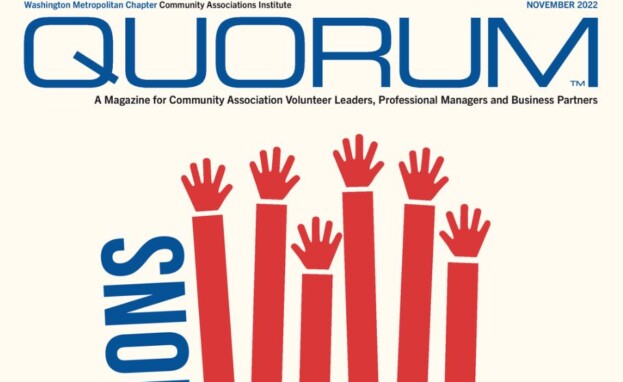This article originally appeared in the November 2022 edition of Quorum.
The last thing any board member, manager, or association attorney wants to do is let their community know that they must redo an election. However, as elections for any position fall under increasing levels of scrutiny, the risk of a repeat is real.
To avoid such an unfortunate situation, board members, property managers, and association attorneys must make sure they understand both the governing laws and the applicable provisions of association governing documents. Understanding these laws, adopting and following procedures, and having more ways to vote should make it easier to increase voter participation and community engagement.
In-person voting and proxy voting have long been common ways to vote in the District of Columbia, Maryland, and Virginia. Voting in person, of course, is when an owner attends a meeting in person and casts their ballot at the meeting. Voting by proxy is when an owner appoints another person, a proxy, to vote on the owner’s behalf, either as the owner directs (directed or instructed), or as the proxy sees fit (undirected or uninstructed). Laws and each association’s governing documents have requirements for proxies. Electronic voting, or voting by electronic submission, was already becoming more popular, but the pandemic greatly accelerated this process. Let’s take a look at the general laws in D.C., Maryland, and Virginia regarding electronic voting.
In D.C., an association’s board of directors may authorize electronic voting regardless of what the association’s governing documents say. A condominium board of directors may authorize electronic voting or submission of votes “if the process used to provide notice of a vote and the means to submit votes or proxies are made in a consistent form approved by the executive board and available to all unit owners and the electronic transmission contains information that verifies that the vote or proxy is authorized by the unit owner or the unit owner’s proxy.”
If an association’s governing documents do not permit electronic voting, D.C. law still permits electronic voting if “unit owners have the option of casting printed secret ballots.” Notably, D.C. law provides a little bit of a “safety valve” that may prevent meetings or certain actions taken at meetings from being invalidated due to certain irregularities, if the person(s) facilitating electronic voting used good faith efforts in those meetings or actions. See D.C. Code § 42–1903.05
In Maryland, similar to D.C., an association’s board of directors may authorize electronic voting regardless of what its association’s governing documents say. An electronic vote must “contain information that verifies that the vote or proxy is authorized” by the unit owner or the unit owner’s proxy. Also like D.C., Maryland law has specific rules for electronic voting when governing documents require secret ballots or anonymous voting. See Md. Code Ann., Real Prop. §§ 11B-113.2 and 11-139.2.
In Virginia, community association voters may vote electronically if (1) electronic voting is not prohibited by the association’s governing documents and (2) the association’s board of directors adopted guidelines for electronic voting. See Va. Code §§ 55.1-1815, 55.1-1953.
While laws in all three jurisdictions permit electronic voting, association boards of directors in each jurisdiction must take action to approve and implement electronic voting. To that end, boards must consider what type of electronic voting they want to implement. Some communities choose to use a third party e-voting platform, while others prefer e-mail submission of votes to the secretary or manager. In addition, boards need to formulate and adopt rules and guidelines governing electronic voting. It may be a good idea for such rules and guidelines to govern voting and elections in general. Of course, these rules and guidelines must then be followed when it comes time for owners to actually cast their votes.
In addition to legal requirements and choosing voting systems, boards should also make sure they adequately communicate to members about upcoming meetings, elections, and other voting initiatives. Good communication can help minimize any complaints about lack of transparency or potential complaints regarding elections.
Elections can be a tricky business and often have high stakes. Having an understanding of legal requirements, utilizing good communication, and being organized can help ensure smooth and successful elections, hopefully free from any extra stress.
You can read the full article in Quorum here: Quorum (CAWM) – November 2022 – page 33 (quorum-digital.com)
Steven Dunn is an attorney at Lerch, Early & Brewer. For more information, contact him at 301-347-1276 or [email protected]


